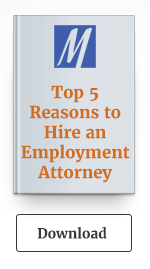
Social media can help you stay connected with friends and family, get and pass on news, and share your thoughts about the issues and problems in the world today. While many people believe that what they do outside of work is their own business, in today’s hyper-connected world, what you post on your social media profiles could have serious consequences at your workplace. You could be disciplined or even fired for the content of your posts, but they may be a form of protected speech. How do you know what’s protected and what’s not?
Employment at Will: Minimal Protection
New Jersey is an employment-at-will state, which means in most cases, employees are free to quit their jobs at any time without notice, and private employers are free to terminate workers without notice, cause, warning, or severance. This means that generally speaking, you can be terminated for anything you post on social media, whether you’re crusading for social issues or re-sharing your favorite cat memes. If your boss is more of a dog person, New Jersey law doesn’t protect you from being terminated for that affront.
Additionally, employers are responsible for ensuring that political speech in the workplace does not create a hostile or discriminatory work environment or otherwise potentially run afoul of equal employment opportunity or civil rights laws. Conversations or interactions on a social media platform with coworkers (especially those you manage) about immigration, racial profiling, police violence, protest movements, or terrorism may create grounds to support a claim of discrimination or harassment based on race, national origin, religion, or ancestry. Expressions of views on religion, abortion, LGBTQIA rights, parental or disability leave laws, or healthcare rights could potentially be deemed harassing or discriminatory to employees based on gender, disability, or religion.
Communicating About Working Conditions
The National Labor Relations Act (NLRA) prohibits private employers from restricting employees’ rights to discuss “terms and conditions of employment,“ such as wages, hours, and working conditions. The law protects the rights of employees to discuss, organize, and take action to address conditions at work. This protection extends to certain work-related conversations conducted on social media. However, mere gripes or complaints do not merit its protection without some relationship to concerted activity among workers. Complaining about your boss, mocking or harassing other employees, or engaging in arguments with co-workers on the internet would probably not be protected.
Because employers have a legitimate and lawful interest in ensuring employees are productive and that social media discussions or activities do not cause or threaten harm in the workplace, create a hostile work environment, or impede the normal operation of an employer’s business, they often implement policies and rules restricting social media use. These are allowed insofar as they do not run afoul of the NLRA and are neutral to all viewpoints. Employer policies, however, are frequently overbroad and, as written, can prohibit some protected speech. If you feel you’ve been terminated or disciplined as a result of an overbroad social media policy, contact an employment attorney.
Expressing Political Opinions
The First Amendment protects public employees, like police officers, school employees, or other government workers, from being terminated or disciplined because of their political views or activities, whether those beliefs are expressed at work or on social media. However, the First Amendment grants no such protection to employees of private companies, who have no federal protection from termination or discipline for political speech.
Some states, including New York, have passed laws specifically prohibiting discrimination based on political affiliation and political activity outside the workplace. New Jersey, however, is not one of them. Use caution when sharing your political opinions in the workplace, and be careful about what you post on your social media, especially if you are connected to your coworkers or supervisors.
Social Media Account Privacy
New Jersey law[1] protects employees' privacy by forbidding employers from requiring them to disclose their social media usernames and passwords or otherwise provide access to their social media accounts. An employer who does so may be subject to fines as well as civil suits. If you believe you have been the victim of an improper adverse employment action based on your social media activity, you should consult with an experienced employment attorney. The attorneys at the Mark Law Firm can help evaluate your case, protect your rights, and recover damages if appropriate.
[1] NJ Rev Stat § 34:6B-6 (2021)
[1] “The NLRA and Social Media.” NLRB.gov. National Labor Relations Board. Accessed 16 Feb 2018.



.svg)